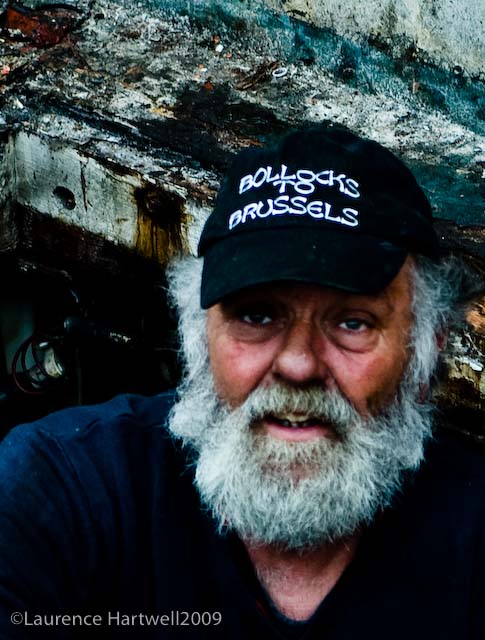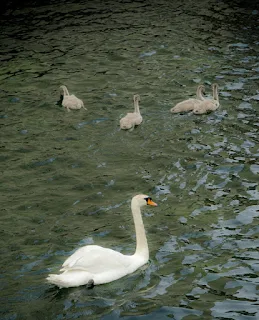"LIVING in Moray, I found it infuriating to see placards everywhere depicting a smiling Haddock draped in the Union Jack proclaiming that a vote to leave the EU would “Save Our Fishing”.
 |
| 700 miles south of Moray - Anti EU and Cornwall Ukip aupporter, Mike Mahon in the early 2000s. |
"Moray was the closest-run district in the whole of Scotland in the EU referendum, with entire family dynasties with links to fishing casting their vote to leave based purely on the misguided mantra that the EU is responsible for the demise of the fishing industry in Scotland. As a former fisherman during the 1980s, and at that time part owner of new-built 65-foot trawler, I think it is time for all of our fishing communities to face up to some hard truths about the fishing industry and at whom the finger of blame for its demise should be pointed.
During the 1980s and early 1990s, the Scottish fleet had become the biggest and most powerful in Europe, to the point where the catching power far outstripped the resource. Boatyards were booming and so were the local economies. The vast majority of these vessels, however, including the one in which I was a partner, were built with the help of a 50 per cent EU grant. Without this, the boat could never have been built. The same applies to the vast majority of boats built in Scotland in that era.
As this new generation of boats, equipped with the cutting-edge of fish-finding equipment, became larger and ever more powerful, the need to catch more fish to fund them increased. New methods of pair trawling utilising much heavier and larger nets were developed, as well as twin-rig trawling with one powerful vessel towing two large nets. This effectively rendered no single area of the seabed, including the spawning grounds, safe from the Scottish fleets’ nets. Many owners had two rotating crews that would change over straight after landing so that the vessel turned right around and was constantly at sea, hammering the fishing grounds seven days a week.
A Catch-22 situation was created where the large boats were so expensive to run and heavily financed that they couldn’t afford to stop fishing for a single day!
By the end of the early 1990s the fish stocks were utterly devastated, with landings down vastly year on year and cod on the brink of extinction and haddock and whiting heading the same way. Extreme action had to be taken, with quota cuts and days at sea being introduced by the EU as the stark scientific data was presented but almost immediately and unsurprisingly dismissed by fishing industry leaders as unproven nonsense.
The EU grants for new vessels had stopped, but young ambitious skippers then turned to the big banks to finance even more powerful super trawlers being built both at Scottish and European yards, which were designed to work in the most extreme conditions at the outer reaches of the continental shelf and Rockall. The traditional inner waters had now been fished out and decimated, not by the EU but by our own Scottish fleet. The EU finally took drastic action when many fish species teetered on the brink of never recovering, and quotas were immediately cut again to the point where the new larger vessels were struggling to stay viable.
To rein in the size of the fleet, a short-term decommissioning incentive scheme based on the vessels’ tonnage and horsepower was introduced, with a maximum compensation of £1 million for the largest vessels. Skippers who had gambled by building multimillion-pound vessels at foreign yards now found themselves at the mercy of the banks to whom they had turned to finance their venture. Cold, hard economics of the banks decided the fate of many young north-east skippers as the unsympathetic banks decided to cut their losses at the fear of further quota cuts and grab the decommissioning payment while it was available, resulting in almost brand new multimillion-pound vessels sailing to the scrapyards of Denmark to be cut up and their owners made bankrupt with their livelihoods in ruins. Many other boat-owners decided to accept the decommissioning grants as well due to a mass migration of crews to the oil industry, adding to the already intolerable stress of trying to stay viable in impossible circumstances.
Today, fish stocks are recovering to healthy levels, but only thanks to EU intervention. Had the Scottish fleet been allowed to continue as it was the end-game would have been the same for the fleet, but there would have been no fish stocks today and no recovery. Many fishing families fished ethically, but if fishermen – especially those from that era who are blaming the EU while waving a Union Jack – need to point the finger at anyone for the tragic demise of the industry and our communities, then I suggest they take a good long look in the mirror."
Graeme Goodall
Buckie, Moray
 The fourth Scottish Inshore Fisheries Conference was held on Thursday 27th and Friday 28th April 2017 at Eden Court in Inverness.
The fourth Scottish Inshore Fisheries Conference was held on Thursday 27th and Friday 28th April 2017 at Eden Court in Inverness.












































